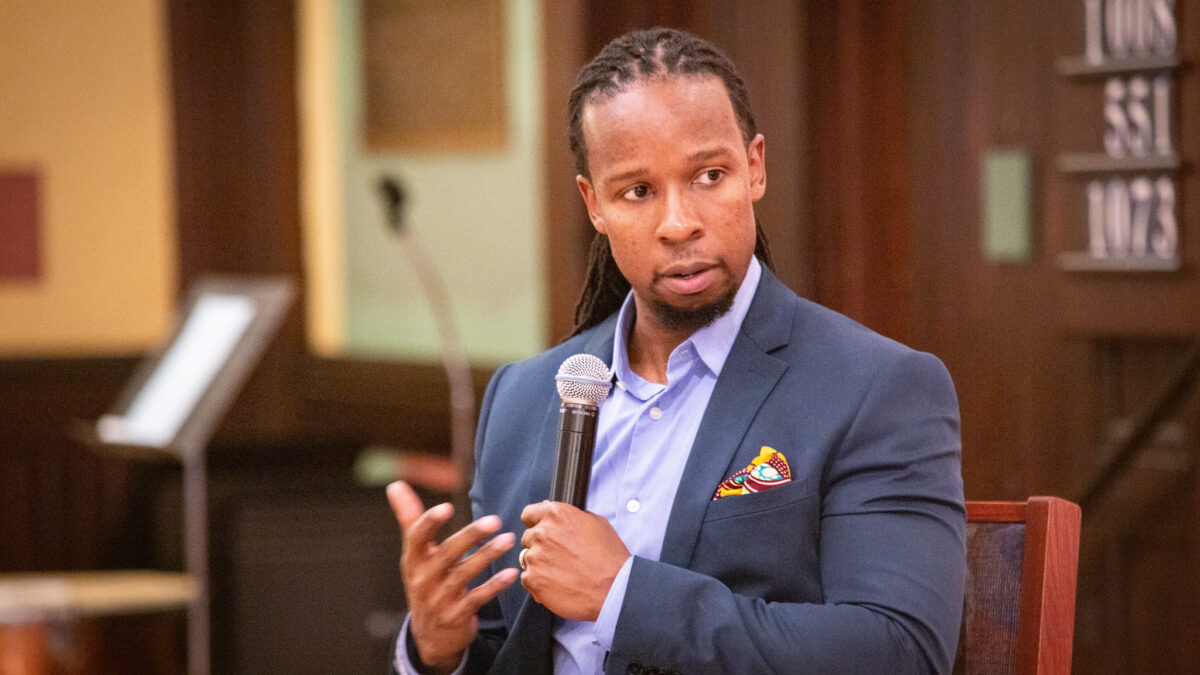
A little less than a year after the first QAnon post, which has since led hundreds of thousands of news junkies down a conspiracy rabbit hole, news correspondent Jack Posobiec from One America News Network spoke with one of the co-originators of the “Q” persona who runs a group of individuals posing as a high-level government intelligence officer. On an anonymous “free speech” platform called 8Chan, they leave thousands of riddles, “clues,” odd questions, and cryptic lines as bread crumbs for their followers to help them in their search for truth.
Many major media outlets have overviewed the nest of conspiracy theories nurtured within Q followers. While many have speculated about who is behind Q and how it came to exist, thanks to Posobiec’s extensive research and the confession of a co-creator who goes by the pseudonym “Microchip,” we now know, with a high degree of certainty, the real origin story of QAnon.
Microchip’s story is believable, and he doesn’t appear to have a good motivation for taking credit for QAnon if he didn’t actually help create it. Additionally, Posobiec indicated he had long suspected it was him before Microchip confessed, after following the suspected Q creators closely for many months.
Although the OANN report was published in early September, it’s hard to take down Q enthusiasts. On the internet, lies don’t die, but continue on in half-life until, like ancient cockroaches, they silently crawl off into the far dark corners of the web. QAnon, while fully discredited for numerous failed predictions and false information in its posts alone, is a full-blown enigmatic cult.
Was QAnon A Mistake?
Like many cults, QAnon encourages its most dedicated followers to give money to the further the “great awakening” (of which Q is supposedly a leader). There is ample evidence outside of Posobiec’s report that the individuals currently running Q are financially motivated and have been for some time.
Several threads of evidence, including Microchip’s confession and Discord logs of his conversation with a co-conspirator, reveal how what was originally intended as a harmless troll to “get people thinking” quickly spun into a mythical persona whose cryptic words developed into a full-fledged conspiratorial worldview for a growing audience, now eager for more riddles (and ripe for financial exploitation).
Microchip, who is a master at creating trending topics on Twitter, and another successful pro-Trump meme-creator named Dreamcatcher, were inspired to do their own trolling by another false identity on 4Chan called FBIAnon, who also claimed to have had insider information as a high-level intelligence officer. Microchip wrote on Discord on August 18, 2017:
that signing FBIAnon is good too. Looks spooky, but we should do our own thing, like change the name to something else and use the Socratic method to question stuff out of ppl. This is what I do while trolling, gets people excited and flip sh** on suggestions alone. You know we’ve I’ve [sic] been doing this forever, we should think of something.
He said Q was more of a “mistake” than a planned, purposeful operation to “take down something.”
In his interview with Posobiec and in the chat logs with Dreamcatcher, Microchip referred to the book “Q” by the Italian prankster/writer collective Luther Blissett, whom he referred to as “the Italian author guy.” As a representative of the Wu Ming (Mandarin for “anonymous”) Foundation, an offshoot of the Luther Blissett collective, told BuzzFeed, “’Q’ is a disguised, oblique autobiography of the LBP. It is often described as Blissett’s ‘playbook,’ an ‘operations manual’ for cultural disruption.”
Finding Content For Conspiracies
Microchip and Dreamcatcher liked the idea from the book of signing “ominous messages” as “Q,” but before they launched the project, they needed to determine what their content would be. They developed a list of Trump supporters’ interests, including George Soros, and the idea that “Obama [was] working with CIA and FBI to steer the Russia investigation,” “Trump surrounding himself with generals,” and “all kinds of crazy theories” from Alex Jones.
“This is what was getting Trump supporters excited,” Microchip explained. “We put together a list of questions that would spark people’s attention” saying they then “filtered it out” on 4Chan.

Q “researchers” work these suggestive questions and fringe ideas into more complete ideas, filling in the gaps with their imaginations and thoughts from other conspiracy theorists.
Dreamcatcher saw an opportunity to go beyond just questions and suggestions. According to Microchip, “There was a [anonymous] post where somebody said ‘Hillary Clinton will be arrested,’” shortly, he said, saying it looked like a “gaslight campaign.” Then, according to Microchip, “Randomly one day Dreamcatcher on a post on 4Chan…took the snippet and added details.” The post said Clinton’s “extradition” was “already in motion.”
Although no post mentioned “Q” until November 2 (where the first reference was “Q Clearance Patriot”), this is listed as his first post in the archive. Of course, Clinton was never arrested.
Ironically, Q is also a top intelligence clearance level for the Department of Energy. That might have cemented the name for Microchip and Dreamcatcher, or for whomever they passed the account off to.
Whatever the specific origins of these themes, Microchip and others knew those ideas appealed to many on the fringe right. The debunked “Pizzagate” theory that a pedophilia ring was being run out of a pizza shop was in the original list of themes for Q content, serving as a critical seed for the intricate thought cloud surrounding Q posts and generating hype among followers.
Is QAnon Exploiting Its Followers?
“We were never a part of the full QAnon,” Microchip said, “but it’s turned dangerous…these people are being gaslit by whoever is doing it now. I didn’t want it to go that far. It was meant to be like a small unifying factor, just like the ‘petition right.’”
Microchip explained:
It’s meant to be funny, meant to get people’s imaginations going. Point is that people are being exploited by other people who are cognizant of the whole process within Trump supporters’ minds and they’re being used and I feel terrible about that. Part of the reason I even decided to speak about the story is because QAnon is dangerous. Since early 2017 [sic] I’ve told people, you’ve gotta stop doing it and I never wanted to be attached to it.

Where there is an audience for conspiracy theories, there’s money to be made. As one Q-skeptic, a YouTuber who goes by the name Unirock, recounted, he was once invited to a Discord server with some of the core “bakers,” or leading Q researchers.
“I was shocked to hear them talking about the best ways to monetize, brand, and make money off the Q movement. I sat and listened for a minute. They told me they liked the way I branded my art into my channel, asked me some questions. I left. I clicked out.”
Another YouTuber named Isaac Green (known online as AntiSchool) also opened up about being contacted by a leading baker named “FarmerFunk,” who tried to entice him to turn his channel into a “baker’s corner,” saying, “I told you that this would be a brand that would last long after Q drifts away. Build your brand wisely, sir.”
This post and other Q-critical videos and posts have since been deleted. Green told The Federalist that he “didn’t want to be associated” with QAnon, while emphasizing that QAnon is not legitimate in any way. He added that he’s experienced “cyberstalking and harassment” from Q followers.
Tracy Diaz was a small-time YouTuber at QAnon’s inception, but took interest in the posts very early on, according to NBC News’ report. Diaz admits Q gave her following a significant boost, but she has maintained that she didn’t make much money off YouTube monetization of Q posts. However, she was accepting donations for “investigative journalism” via Patreon while Q was a significant part of the content she produced. She currently has more than 96,000 YouTube subscribers and 784 patrons.
Like other content creators who had previously spoken favorably of Q posts, she realized the people behind Q aren’t doing what’s in the country’s best interest. Q “has amassed a HUGE cult-like worship in many cases,” she wrote on Twitter, and send an “army of people hanging on their every word” after their targets. “This is terrifying.”
When the 99 cent QDrops app, which allows users to “redpill with ease,” launched in April, it climbed to the top slot in the “entertainment” section. It also landed a spot in the top 10 most popular among Apple iOS apps and top 200 in paid iOS apps, according to Newsmax. Apple removed the app in July, but it has more than 5,000 installs from the Google Play store alone.
Patriot’s Soapbox And Monetizing QAnon
Perhaps the biggest money-makers in the Q realm are Coleman Rogers (PamphletAnon) and his wife Christina Urso (who goes by the name Radix), who started and run Patriot’s Soapbox (PSB), a 24/7 YouTube livestream of Q analysis and registered LLC. Unirock, who has been investigating QAnon for several months, believes that PamphletAnon is responsible for turning QAnon into a cash cow.
Although the corroborating video has been deleted by Patriot’s Soapbox, Unirock told me that during the first two months of the channel, viewers were asked to leave the livestream on at all hours of the day so they would always have a high view count.

The PSB team added $20,000 to $40,000 in equipment to upgrade their setup over the first couple of months, by Unirock’s estimates. PSB also has a merchandise store. The channel has more than 55,000 subscribers and accepts donations via PayPal and a variety of cryptocurrencies.
There are other indicators that Q promoters are financially motivated. On April 14, Q posted a picture of an obscure highway billboard that says “Where We Go One We Go All,” the unofficial the slogan of the Q community. It directed viewers to a website called DoUKnowQ.com, which, at the time I first visited the sight, sold Q merchandise in addition to providing “Q news” and “Q proofs.”
Free Markets Or Profiting Off Stupidity? Why Not Both?
Q believers have shrugged off the fact that Q researchers are profiting off the movement, citing “free market” principles. Yet whoever was posting as Q took pains to “call out” people who are profiting off the movement, saying they aren’t real “patriots” and that the only “profit we should all be striving for is true freedom.” This was two weeks after Q posted the billboard photo.
To the skeptic, this appears to be a deflection. Q believers have not yet provided me with a reasonable way to reconcile the strong statement from their leader with the profits being made off Q.
On top of all the nonsensical content is the forensic data indicating Q’s fraudulence. As Posobiec noted, PamphletAnon was once caught “claiming a post was from Q when the post did not contain the actual trip code validation. Not that hard to figure out how he knew about the post when no one else did.” Posobiec also points out that “the tripcode changes seemed to coincide with changes in the lineup of board moderators as new mods were brought in and old mods were kicked out of the group.”

QAnon’s passwords were once hacked and published along with a technical discussion from the hacker outlining the evidence that Q doesn’t secure his content the way a “high level intel officer” would. Unirock reminded me of a still more suspicious behavior: Q only posts on someone else’s 8Chan board, where Q-drops could be potentially deleted by moderators or Q’s passcode disabled. A real government agent wouldn’t put this supposedly important information at risk like that.
Could Microchip have generated fake logs to take credit for Q? It’s a possibility. But his story doesn’t exactly make him look good. Here we see a man admitting to trolling, to baiting Trump supporters with conspiracy theories, and seeming amused when his friend literally made up a prediction out of whole cloth to get the fringe right riled up––just for laughs.
Q believers flatly reject all evidence that Q is a fraud, only a sliver of which is provided in this article. Instead, they earnestly insist that Q researchers are doing “real journalism,” and that I need to “red pill” and “leave the Matrix.” They do not consider that perhaps it is they who need to wake up from their own LARP matrix and leave the virtual compound.
QAnon has such a dangerous hold over its followers because it appeals to deeper, spiritual needs. Wu Ming provides incisive commentary:
In certain ways, conspiracy theorists are in the same league as psychics, magicians, astrologists and gurus of pseudo-medicine: all these people work in the field of wonder…In doing this, they exploit human needs, because in our life we do need surprise, wonder, new angles from which looking [sic] at things and thinking we’re different. Conspiracy theorists provide all that, and channel the people’s anxiety on [sic] their lives into the belief in an all-explaining narrative.

Microchip implored Q followers to wake up. “QAnon is not resolving problems. There is no mysterious agency dispatch B to come save you riding in on a white horse like one would believe. But the idea is that you have to get out and you have to actually do stuff because QAnon is not going to save you…you gotta go out and vote, you gotta go out and do activism. You can’t just sit at home and hope that these magical guys behind the scenes are going to magically save the USA because they’re not there.”
Words to live by.
Christina Urso’s screenname has been corrected.









